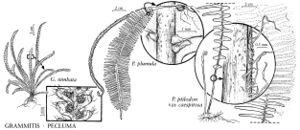Grammitidaceae
Plants perennial, mostly small, on rock or commonly epiphytic [rarely terrestrial]. Stems long to short-creeping or suberect, usually unbranched, bearing scales [rarely scales absent], solenostelic (having phloem on both sides of xylem) to dictyostelic (having complex nets of xylem). Leaves erect, arching, or pendent, monomorphic [rarely with specialized fertile areas], less than 50 cm [rarely longer], usually scaleless throughout. Petioles often dark-colored and wiry, commonly terete, usually less than 2 mm diam., articulate or not articulate, with 1 or 2 vascular strands. Blades simple and entire to commonly pinnatifid or 1-pinnate, rarely 2-pinnate or more divided, glabrous or commonly bearing hairs, especially on petioles and rachises; hairs tan to dark reddish-brown [or transparent], unicellular to multicellular; rachises often dark-colored, not grooved adaxially. Veins free [to anastomosing in simple patterns]; hydathodes present or absent, sometimes obscured by lime dots adaxially. Sori abaxial on veins, round to oblong [occasionally elongate]; paraphyses present or absent, these glandular or hairlike; sporangia with stalk of 1 row of cells; indusia absent. Spores greenish, tetrahedral-globose, trilete, surface commonly papillate. Gametophytes greenish, borne aboveground, ribbon-shaped, sometimes bearing multicellular gemmae.
Distribution
Mostly tropical and subtropical, North America, ca. 250 in Mexico, West Indies, Central America, South America
Discussion
Circumscription of genera is unsettled and in some cases arbitrarily based on blade dissection. Generic limits need redefinition and are the subject of current study. The family description above encompasses the worldwide variation. Relationships of the family have generally been thought to be with the Polypodiaceae with which the family is sometimes combined, but that is open to question. Most species are epiphytic, and many occur in cloud forests at middle and high elevations.
Genera ca. 10 or more, species ca. 500 or more (1 genus, 1 species in the flora).
Selected References
None.
